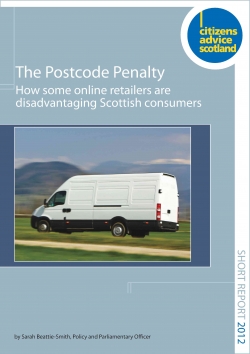
Over 1 million Scots are being ‘routinely ripped off’ by unfair delivery charges because of where they live, according to new evidence published by Citizens Advice Scotland.
By analysing over 3,000 customer complaints and over 500 online companies, we have uncovered a ‘postcode penalty’ that sees some Scots having to pay an average of nearly £19 extra when buying goods online. The problem does not just affect remote rural and island areas, but postcodes right across Scotland. It hits businesses as well as families.
Download the report via the link at the foot of the page.
Key findings
- At least 1 million Scots face surcharges, late delivery or are refused delivery altogether when they try to buy goods online
- Consumers in Scotland’s island communities face a postcode penalty of nearly £19 extra (£18.60) to deliver goods they buy online – that’s a 500% mark up on the standard delivery price. Consumers in the Highlands are charged an extra £15 per delivery on average
- Of the 534 retailers whose policies we investigated, 335 of them (63%) charged extra for delivery to certain parts of the UK. 72% of those surcharges applied to consumers in Scotland, indicating that Scottish consumers are disproportionately affected by delivery surcharges
- 55% of retailers who restricted the areas of the UK to which they would deliver refused to deliver goods to any Scottish islands, disadvantaging the estimated 100,000 people who live in island communities
- Ofcom’s latest statistics show that UK shoppers spent an average of £1000 on online shopping on 2011
- 85% of the consumers who responded to our survey said they would warn family and friends against using a retailer with unfair delivery practices
- 34% of retailers we investigated said that delivery would take longer for consumers in some parts of the UK. 39% of these retailers took an extra three or more days to deliver to consumers in certain parts of Scotland, with some customers waiting as long as 35 extra days for delivery compared the rest of the UK
- 69% of retailers we investigated did not offer delivery by Royal Mail, despite the Royal Mail’s universal service obligation meaning that delivery by this method costs the same across the UK.
What should happen?
-
Delivery prices should not be based on arbitrary post codes and they should be explained simply and displayed clearly by retailers on their websites
-
Enforcement bodies such as Trading Standards services and the Office of Fair Trading should ensure that retailers across the UK are aware of and complying with the Consumer Protection (Distance Selling) Regulations 2000. The OFT’s Distance Selling Hub is a very useful resource which could be further promoted
-
Retailers should ensure that they are complying with distance selling regulations and refer to the DSR Hub
-
Retailers should give full details of how long delivery will take as early in the shopping process as possible. Statements such as “free next day delivery” should not be used to promote the site if next day delivery is not available to certain UK consumers
-
Wherever possible, retailers should offer delivery by Royal Mail
-
Where one courier firm does not deliver to certain areas, retailers should shop around for alternative couriers who do
-
The universal service obligation which ensures that delivery of packages up to 20kg costs the same across the UK must be protected
-
Enforcement bodies should work with business groups such as the Federation of Small Businesses, Chambers of Commerce and Highlands and Islands Enterprise to ensure that business to business internet sales are conducted in such a way that Scottish businesses are not disadvantaged.
What can you do?
If you have experienced unfair delivery practices, you can complain to the retailer. There are template letters available on Adviceguide as well as advice on your rights when buying online.